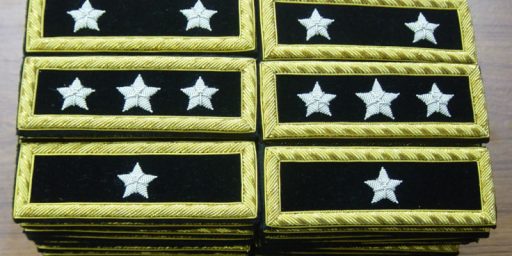Coming Military Coup?
Thomas Schweich fears a military coup in the United States. Or something like that. In a breathless WaPo op-ed, “The Pentagon is muscling in everywhere. It’s time to stop the mission creep” (with the clever subhead, “The Pentagon is muscling in everywhere. It’s time to stop the mission creep”) he fears that the proliferation of former military officers in high positions foreshadows, well, something.
We no longer have a civilian-led government. It is hard for a lifelong Republican and son of a retired Air Force colonel to say this, but the most unnerving legacy of the Bush administration is the encroachment of the Department of Defense into a striking number of aspects of civilian government. Our Constitution is at risk.
President-elect Barack Obama’s selections of James L. Jones, a retired four-star Marine general, to be his national security adviser and, it appears, retired Navy Adm. Dennis C. Blair to be his director of national intelligence present the incoming administration with an important opportunity — and a major risk. These appointments could pave the way for these respected military officers to reverse the current trend of Pentagon encroachment upon civilian government functions, or they could complete the silent military coup d’etat that has been steadily gaining ground below the radar screen of most Americans and the media.
As the son of a retired Army first sergeant, it’s easy to say this: This is BS.
We’ve had retired military officers — and, frequently, active duty military officers — in key intelligence and national security positions since time immemorial. The first several CIA directors were military men and we’ve had the likes of Brent Scowcroft (twice!) and Colin Powell as national security advisors. The Republic not only survived but flourished.
But, no more:
While serving the State Department in several senior capacities over the past four years, I witnessed firsthand the quiet, de facto military takeover of much of the U.S. government.
Why was I not told of this?!
So, what overarching authority are military men taking in running our civil society? Well, it seems, they’re doing jobs in hostile fire zones that nobody else wants to.
The first assault on civilian government occurred in faraway places — Iraq and Afghanistan — and was, in theory, justified by the exigencies of war.
The White House, which basically let the Defense Department call the budgetary shots, vastly underfunded efforts by the State Department, the Justice Department and the U.S. Agency for International Development to train civilian police forces, build functioning judicial systems and provide basic development services to those war-torn countries.
This may have been bad policy. But it’s not exactly “de facto military takeover of much of the U.S. government” to have generals calling the shots as to how to run operations in a foreign war zone.
The result of letting the Pentagon take such thorough charge of the programs to create local police forces is that these units, in both Iraq and Afghanistan, have been unnecessarily militarized — producing police officers who look more like militia members than ordinary beat cops.
Perhaps because ordinary beat cops would have certain difficulties in fighting the Taliban? Last I checked, Afghanistan wasn’t even slightly close to a normal society, even a high crime urban area.
Or consider another problem with the rising influence of the Pentagon: the failure to address the ongoing plague of poppy farming and heroin production in Afghanistan.
He’s got a point here. We should use the same civilian experts who have so brilliantly eradicated illicit narcotics domestically. Oh.
I’ve been in half a dozen briefings with the highest level military commanders in Afghanistan. Strangely, every single one of them has been acutely aware of the problems poppy farming is causing. They also understand that every potential solution brings its own set of massive problems.
As military officers sought to take over the role played by civilian development experts abroad, Pentagon bureaucrats quietly populated the National Security Council and the State Department with their own personnel (some civilians, some consultants, some retired officers, some officers on “detail” from the Pentagon) to ensure that the Defense Department could keep an eye on its rival agencies.
This is an effort to prevent precisely the kind of stovepiping Schweich is whining about. And each of those agencies has personnel doing tours of duty in the Pentagon and elsewhere in the Defense Department.
This sort of thing goes on for a bit until we’re finally given some policy solutions.
1. Direct — or, better yet, order — Gates, Jones, Blair and the other military leaders in his Cabinet to rid the Pentagon’s lower ranks of Rumsfeld holdovers whose only mission is to increase the power of the Pentagon.
And replace them with new people whose only mission is to increase the power of the Pentagon? Or with non-DoD personnel?
2. Turn Gates’s speeches on the need to promote soft power into reality with a massive transfer of funds from the Pentagon to the State Department, the Justice Department and USAID.
In theory, this makes sense. And some of the top generals in charge of the Afghanistan mission agree that State and USAID should have more funding and take a greater part in these missions. (I’m dubious as to why Justice should be involved overseas.) But it’s not as if there are FSOs and other civilians lining up around the block hoping for a chance at going to a hostile fire zone. The main reason that the military has taken over these missions is that they go where they’re told, usually cheerfully.
3. Put senior, respected civilians — not retired or active military personnel — into key subsidiary positions in the intelligence community and the National Security Council.
This is a solution for a problem that doesn’t exist. Aside from vague uneasiness about this practice, Schweich makes no argument that these people aren’t doing a good job. Beyond that, there will be oodles of civilians in “key subsidiary positions,” anyway; there always have been and fewer Ivy League PhDs are veterans these days.
4. Above all, he should let his appointees with military backgrounds know swiftly and firmly that, under the Constitution, he is their commander, and that he will not tolerate the well-rehearsed lip service that the military gave to civilian agencies and even President Bush over the past four years.
Again, he’s adduced precisely no evidence that the military — let alone those “with military backgrounds” — are insubordinate to the president. If anything, the charge would seem to be that they’ve been too quick to say, “Yes, Sir! Three bags full!” To the extent that civilian agencies have been given short shrift, it’s because Bush and his team has made that decision.






Coming Military Coup? http://bit.ly/Ac69 (re: Sunday’s WaPo article)
There’s a special irony in that in another op-ed in the Washington Post today Wes Clark explains why there won’t be a problem between the incoming administration and the military, emphasizing the military’s acceptance of civilian control.
Here’s a little clue for Mr. Schweich:
The reason you see so much DOD in State is that DOD has money; State does not. State has realized that it can accomplish much more using money that DOD has running out its ears. DOD might see this as ‘extending its tentacles’, but most likely not.
DOD, rather, sees it as a way to do things it wants to do using tools that State has and the military does not.
Particularly in areas like the ‘War on Drugs’, that should have been abundantly clear to the Ambassador. State doesn’t have a single crop duster in its inventory, nor an deciliter of paraquat. Its police powers are limited to Diplomatic Security (which does work with other agencies). The Ambassador might also care to compare the number of personnel under the control of State and the DOD, not to mention at all the DOD contractors.
I was delighted to have a DOD contractor in my office in Riyadh. Her presence allowed me to do things I simply could not have done otherwise, including the monitoring of jihadi websites. She identified channels through which terror funding was being raised. That served me as it identified channels I had to pay attention to. It served DOD as it gave them a glimpse of otherwise invisible entities they needed to be concerned about. It gave Treasury and FBI new targets of investigation.
That simply would not have happened without DOD funding shared with State.
Re: “As the son of a retired Army first sergeant, it’s easy to say this…” and “…hard for a lifelong Republican and son of a retired Air Force colonel to say this…”
As a lifelong Republican and son of a retired Air Force colonel myself, it’s easy for me to say that Mr. Schweich is delusional. (I do have to admit to voting more like a Democrat for the past 16 years or so.) That being said, the recent statements of Odierno, Mullen and Petreaus regarding drawdowns in Iraq do tend to make me a bit uneasy.
Yeah, but it does have the advantage of feeding the leftie anti-military paranoia. (Spit)
This is crap from folks who don’t understand the military or the folks who serve in it – just a headline.
If it comes down to rule by a draft-dodging liberal elitist like Hussein or a decorated patriot, I take the patriot every time.
We need someone to protect us from the Chicago-style corruption that Obama has forced on the country.
If there had been a quiet military coup, the war in Iraq would not have been so screwed up by the civilian leadership.
As a 21 year veteran, I agree that Mr Schweich is definitely incorrect.
I remember that a lot of State Dept. personnel at first refused to deploy to carry out State’s mission in Iraq, no wonder the military had to take it on for them.
If State is underfunded, that is not the DoD’s fault.
Stability and security have to be in place before we can move forward, and in a COIN fight, it takes both DoS and Dod personnel to make it happen.
Disqualifying veterans from senior positions in government, sounds a bit discriminatory, I’m sure he supports the troops otherwise, I wonder if he’s familiar with Kipling’s poem “Tommy”.
Only an eight year veteran, but I do think there are some issues with the military taking over things it should not. Much of this has been because of the lack of State Department input and manpower. Remember the military marching bands vs FSO’s.
The current administration has also been guilty of lionizing our military, as a means of gaining support for their political goals. The military may have been complicit. There were certainly accusations that the military dragged its feet in response to Clinton, but given the strong Republican bent of the officer class, may have been less critical of Bush/Cheney/Rumsfeld that they should have been.
This last issue looks to be changing some. As I have followed publications from the military over the last twenty years or so, I note a recent change in tenor that is more critical of Republican philosophy, especially neocons.
Steve
Why does the WaPo waste time with morons like Schweich? For that matter, if he’s so afraid of a military takeover, shouldn’t he have been more fearful when ex-military men were in the actual hot seat (i.e. the Presidency), and could appoint whoever they want?
I haven’t heard talk of a coup in years. Actually, since the 1990’s. Several of my redneck kentucky relatives were of the opinion that Beel Cleenton was so evil and unamerican that the military should assume control of the white house, execute him, and then call a special election. These were the same people who thought he would use Y2k as an excuse to declare martial law and round ordinary citizens up into prison camps ruled by the chinese.
No I’m not kidding. You think I’m kidding? Go to Alex Jones’s website. There are more kooks out there than you think. And they all vote Republican, btw.
So you voted for John Kerry over GWB?
@SGT SKI
“I remember that a lot of State Dept. personnel at first refused to deploy to carry out State’s mission in Iraq, no wonder the military had to take it on for them.”
Do you often share your delusions and false memories in public fora?
Every single FSO position in Iraq and Afghanistan, from day one, was filled by a volunteer for that job in that place.
That is still the case. And they pay their full federal income taxes while they’re doing it.
This has resulted, over the past year, in the State Dept. having to leave unfilled more than ten percent of its total FSO positions worldwide, which means a shortfall in FSO deployments to over 260 posts overseas plus Washington, D.C.
There’s an old Washington saying: “Where you stand depends on where you sit”. Senior officials–political appointees or career government–have a disconcerting habit of becoming strong advocates for their current agencies, not those they may have worked at previously. This applies to military officers on detail to civilian agencies, or to civilians working for another government department. The reason is simple: that’s how they’re evaluated. Just think Henry II and Thomas Beckett.
The military goes into war zones fully armed and ready for combat. That’s what they do, and do very well. State Department officers, on the other hand, also go into some very dangerous places, like the PRTs in Iraq and Afghanistan, with much less firepower on call. It’s not all cookie-pushing and lying in formal wear, nor is it all the Paris-Rome-Vienna “Opera Circuit”, either. And, as Consul-at-Arms notes, the State guys don’t get a tax break for serving in places like Iraq, Afghanistan, Congo, or Pakistan.
I’ve linked back to you here.
@Consul-At-Arms: Try this link for evidence of FSO and other State Dept. personnel who refused to deploy.
Nice attempt at intellectual and sarcastic gravitas on your part. Really. However, your pitiable knowledge of the subject-at-hand is lacking. Why don’t you try to learn something about what you try to disparage before you show your ignorance?
@skh.pcola,
I read the article, which fails to name even one of the FSOs who supposedly refused to deploy. In fact, it’s a bit weasel-worded, to wit:
“Many U.S. employees have outright refused repeated requests that they go to Iraq, while others have demanded that they be assigned only to Baghdad and not be sent outside the more secure Green Zone, which includes the American Embassy and Iraqi government ministries.”
Couldn’t you find anything at all more up-to-date than Feb. 2007?
The unnamed employees who’ve “outright refused repeated requests that they go to Iraq” aren’t identified by agency, just as “U.S. employees”
So much for your attempt to smear FSOs; learn to read bias-media like the IHT a little more closely. You do know, by the way, who publishes the International Herald Tribune, don’t you?
I’ve covered this media-generated “issue” in the past at my own web log; you can read up on it to your heart’s content there. Bottom-line: the media (with moderate-to-great success) attempted to publicize a supposed “rift” between DOS and DoD, stipulating an imaginary “mutiny” of FSOs “refusing” order to Iraq and Afghanistan.
The truth is less colorful and doesn’t raise as many people’s blood pressure; every FSO job has been filled, year in and year out, and it’s been filled by a volunteer every single time. And the number of billets has done nothing but go up, as the new embassy has been established, as new PRTs and e-PRTs have been fielded.
You may kiss my “gravitas.”
@skh.pcola,
I read the article, which fails to name even one of the FSOs who supposedly refused orders to deploy. In fact, it’s a bit weasel-worded, to wit:
“Many U.S. employees have outright refused repeated requests that they go to Iraq, while others have demanded that they be assigned only to Baghdad and not be sent outside the more secure Green Zone, which includes the American Embassy and Iraqi government ministries.”
Couldn’t you find anything at all more up-to-date than Feb. 2007?
The unnamed employees who’ve “outright refused repeated requests that they go to Iraq” aren’t identified by agency, just as “U.S. employees”
So much for your attempt to smear FSOs; learn to read bias-media like the IHT a little more closely. You do know, by the way, who publishes the International Herald Tribune, don’t you?
I’ve covered this media-generated “issue” in the past at my own web log; you can read up on it to your heart’s content there. Bottom-line: the media (with moderate-to-great success) attempted to publicize a supposed “rift” between DOS and DoD, stipulating an imaginary “mutiny” of FSOs “refusing” orders to Iraq and Afghanistan.
The truth is less colorful and doesn’t raise as many people’s blood pressure; every FSO job has been filled, year in and year out, and it’s been filled by a volunteer every single time. And the number of billets has done nothing but go up, as the new embassy has been established, as new PRTs and e-PRTs have been fielded.
You may kiss my “gravitas.”